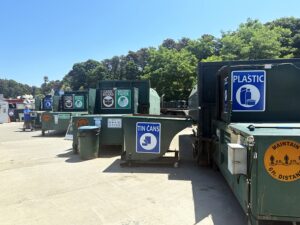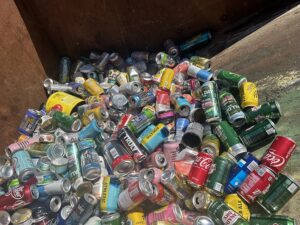August is peak trash season here, and the staff who run the Outer Cape’s transfer stations say there will be challenges in coping with volumes more than four times what they are in the winter.

Staffing shortages, outdated equipment, and even traffic are among the strains reported in Provincetown, Truro, and Wellfleet. The Independent was unable to get details from Eastham, despite repeated attempts to talk with the DPW director and staff there.
In Truro, 65 percent of the entire year’s trash is collected in the summer. Last year there was an increase of nearly 300 percent from the slowest month, February (57 tons), to the busiest one, August (224 tons). Facing a recruitment crisis at the transfer station this year, the team was preparing to prioritize.
“We have three empty positions this year,” said DPW Director Jarrod Cabral, who added that he had one staff member out with an injury. “For us to get around that, we are not open seven days a week.”
Closing the transfer station to the public on Wednesdays and Thursdays means Cabral can deploy more resources to haul trash on those days. With an additional driver freed from attendant duties, two trash-filled trailers instead of just one can be dispatched to the Southeastern Mass. Resource Recovery Facility, a waste-to-energy plant known as SEMASS that burns the trash not far off Cape in Rochester. Summer traffic hikes the travel time from a minimum of four hours to as many as eight.
Wellfleet’s transfer station foreman Mike Cicale tried to get ahead of the rush by hiring extra staff, but he had his normal two days a week off canceled for the summer anyway. He said his team, which last year dealt with 135 tons of trash in August, had been hit by the recent departure of several of the town’s harbor workers.
“There’s only a few seasonal people left at the harbor, so we all had to go fill in,” he said, adding that residents and visitors should not notice the difference. “All operations are continuing as normal,” he said. “That’s thanks to the staff putting in extra effort and the public who have been willing to put things in the right places.”
Cicale is talking about the fact that the town never adopted single-stream recycling, which turned out to be a good decision for ensuring that more trash is kept out of the solid waste stream. He’s also talking about this year’s effort to separate plastic and tins in a pilot that could improve efficiency further and save money.

Signs at the transfer station in July explained that, while some places mix recycling together, “they spend much more money to do that” because vendors charge the town to separate them. “We were mixing tins and plastic based on an old dual-stream system from years and years ago,” Cicale said. “So, we started a program where we refurbished some tip carts that we had lying around and started diverting the tins into there.”
The results of the pilot will be assessed in August, and the town will decide if the program is worth continuing.
One thing it won’t help with is the proliferation of packaging that meld plastic and paper. Those cannot be recycled.
“We’re always trying to catch up on the newest packaging that doesn’t work with our system,” said Cicale. “The recycling system works if you have packaging from 29 years ago.”
Provincetown has one of the Cape’s busiest transfer stations year-round, with even its slowest month of February seeing 112 tons of waste dumped in 2023.
Last August, that figure jumped more than 480 percent to 653 tons. As in Wellfleet, extra staff are hired for the season every year, but at the end of July, the Provincetown DPW was short on equipment to move the trash.
“We are waiting for two new trailers to arrive,” said DPW Deputy Director Sherry Prada, referring to the 45-foot-long trucks used to move trash around. “During the busy season, trailers need to be swapped out more frequently, because they are quickly filled up with the town’s trash, so they can be transported and emptied, and then brought back to be used again.”
Almost as soon as the calendar flips from August to September, the amount of trash drops significantly. In Provincetown it falls by nearly 75 tons in one month. That brings some seasonal relief, but the challenges and strains of the summer will only get recycled next year.
